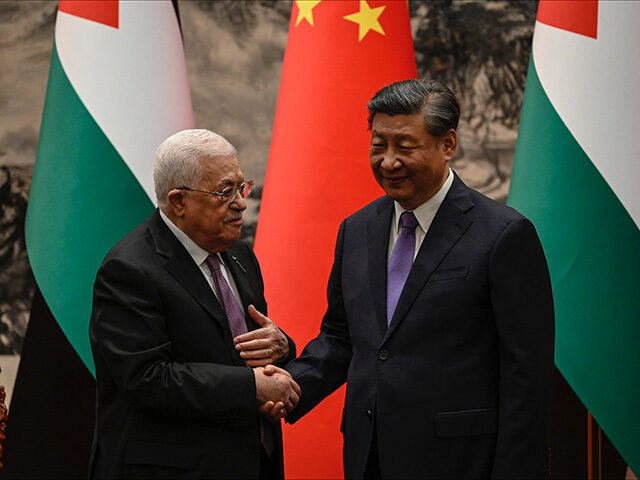After meeting with Palestinian President Mahmoud Abbas in Beijing on Wednesday, Chinese dictator Xi Jinping announced a new “Chinese-Palestinian strategic partnership,” and presented China as an impartial broker for peace talks between the Israelis and Palestinians.
Xi’s foreign minister, Qin Gang, said a dash of “Chinese wisdom” might be just what the stalled “peace process” needs.
Abbas and his own foreign minister, Riyad al-Maliki, arrived in Beijing for a four-day visit on Tuesday. It was the fifth time Abbas has paid a state visit to China.
The Chinese Foreign Ministry saluted Abbas as an “old and good friend of the Chinese people” and said the Chinese Communist regime has “always firmly supported the just cause of the Palestinian people to restore their legitimate national rights,” a position Xi echoed after meeting with Abbas.
Xi said China is “ready to strengthen its coordination and cooperation with Palestine to promote an all-encompassing, just and longstanding resolution of the Palestinian issue.”
Not many details about the scope of the Chinese-Palestinian partnership were provided, although Abbas’ economic adviser Mohammed Mustafa said on Tuesday that China intends to fund four projects in the West Bank, including a solar power plant, a solar panel factory, a steel plant, and road construction.
Xi and Abbas also signed cooperation agreements on technology and economic development, agreed to a mutual visa exemption for diplomatic passports, and declared a sister-city relationship between the Chinese city of Wuhan and the PA seat of Ramallah.
Xi restated China’s support for full membership in the United Nations for the Palestinian Authority (PA), a move opposed by the United States barring a peace agreement between the PA and Israel.
Having placed such heavy bets on Abbas, Xi and his top officials insisted they could help broker that long-elusive peace deal, pointing back to their much-ballyhooed diplomatic triumph of the reconciliation brokered between Saudi Arabia and Iran in March.
“The fundamental solution to the Palestinian issue lies in the establishment of an independent Palestinian state based on the 1967 borders with East Jerusalem as its capital,” Xi declared.
“China attaches great importance to the Palestinian issue and has always firmly supported the just cause of the Palestinian people to restore their legitimate national rights,” Chinese Foreign Minister Qin Gang said after meeting with his Palestinian counterpart on Tuesday.
“China will continue to support the peace talks, which are the right direction, and will bring Chinese wisdom and vigor to the resolution of the Palestinian issue,” Qin said.
The UK Guardian reported on Sunday that Palestinian officials do not believe China can make a “serious attempt to revive the Israeli-Palestinian peace process.” Instead, they see Xi’s grandstanding as an effort at “bolstering Beijing’s credentials on the world stage” and burnishing Xi’s credentials as a “global statesman.”
“This is about China showing its power and making the U.S. look weak,” said an unnamed source in the PA. “Xi is meeting with lots of Arab leaders because he knows they are not happy with the U.S. taking a back seat in the region.”
The Guardian doubted the Israeli government would muster much enthusiasm for China as an interlocutor, as they are “wary of China’s economic ties to Iran,” eager to preserve their alignment with the United States, and somewhat miffed that Beijing has not extended an invitation to an Israeli delegation.
Foreign Policy noted on Monday that China’s big diplomatic breakthrough between Iran and Saudi Arabia has not amounted to much in practice over the past three months, including few signs of “de-escalation” and no movement toward peace in Yemen, where Tehran and Riyadh back opposite sides of the Houthi insurgency.
“The big story about the Iran-Saudi-China deal is not the development of a more stable, pacific Middle East in which regional actors take matters into their own hands to forge a better future. It is actually more straightforward than that: The Saudis lost, and normalization of diplomatic relations with Iran is just cover for that setback,” Foreign Policy said.
In that environment, Israel is unlikely to welcome “Chinese wisdom” from Iran’s allies in Beijing, especially as Iran escalates its “shadow war” against Israel through proxies in Syria and Iraq.

COMMENTS
Please let us know if you're having issues with commenting.